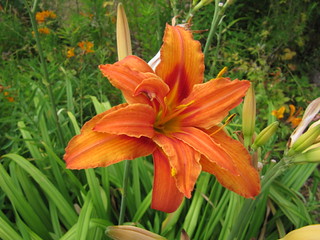First, a Word of Caution
| (Photo credit: Wikipedia) |
Do the research first to make sure the species you are entertaining eating is, in fact, edible. Some regions produce both edible and inedible varieties of similar plants. Your county's extension office may be a good place to start, as well as a local nursery.
Also, if you have allergies, specifically to pollen, be aware that even if you aren't allergic to a particular flower you are about to eat, that flower may be related to a plant you are allergic to. Even though you remove the stamen and pistil, the pollen is part of the flower structure itself, and may cause a negative reaction.
Once you have determined that a flower is safe to eat, and that you not allergic, you are ready to learn how to find, clean, serve, and enjoy these edible flowers.
Pretty Tasty Bouquets
There are many flowers that have wonderful color, flavor, and design that aren't found in exotic locations. These flowers are often found in country gardens, window boxes, or even hanging baskets. Let's take a look at some of the more familiar flowers that can provide your salads with a gourmet twist:
Bachelor Button, or Cornflowers, are well known for their bright blue color and best described as having a clove-like flavor that is a bit sweet and spicy at the same time. Although they are often used just as a pretty garnish, when cleaned, the little petals can be sprinkled over a bed of mixed greens for a pretty and spicy touch.
Fuchsias are those exotic-looking brightly colored flowers that you'll often find in hanging planters, most likely around Mother's Day. The blossoms are a little on the bitter side, but make a nice addition to a savory salad such as a spinach salad with a tangy dressing. You can also use the blossom to compliment a buttery or sweet lettuce salad, playing the gentle sweetness off the somewhat bitter surprise from the pretty blossom.
Carnations are eaten by separating the sweet petals from the white base, which is very bitter. Scatter the petals on top of a bed of romaine lettuce and add complimentary flavors of both sweet and tangy ingredients and a light dressing. There are a wide range of colors so you can find something for any salad.
Chrysanthemums are big, bold, beautiful flowers that have big, bold, beautiful flavors. In colors ranging from reds and oranges, to creams and yellows, these edible favorites have a somewhat peppery taste. The petals may be lightly blanched in boiling water before adding to your salads. The base of the flower is very bitter, so be sure to use only the petals.
| Day lilies. (Photo credit: wallygrom) |
English Daisies are so familiar to us that we often walk right by them without noticing. Pick the petals off (he loves me, he loves me not) and sprinkle on top of an ordinary green salad and you'll have something unexpected. The flavor is rather mild, so they are used mostly for the pretty gourmet look they give a salad.
Johnny Jump-Ups are another very familiar flower that often goes unnoticed. Similar in appearance to pansies only very tiny, the blossoms have a slightly minty or wintergreen taste, making them perfect as a garnish for a fresh cucumber salad. Just imagine the pale purple petals sprinkled over the green cucumber slices. Very pretty, and tasty, too!
Pot Marigolds are a common flower with uncommon flavor and color. These flowers were used for many years to add color to soups, and now are often enjoyed sprinkled over salads to add a citrus-like flavor. Use on any salad you would squeeze a lemon or zest an orange over.
Of course, there are more exotic flowers that add unique flavor, color, and overall design impact to a simple salad. But, these flowers are the ones many of us can grow in our very own gardens. With just a little imagination, you can plan, plant, and harvest a floral bouquet to turn any salad into a gourmet specialty to rival any professional chef!


No comments:
Post a Comment
We welcome comments and suggestions!